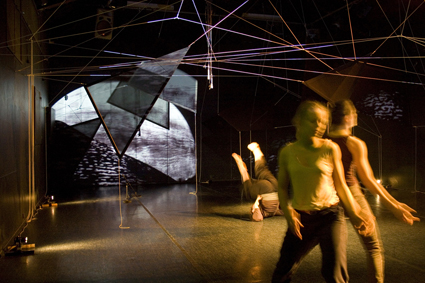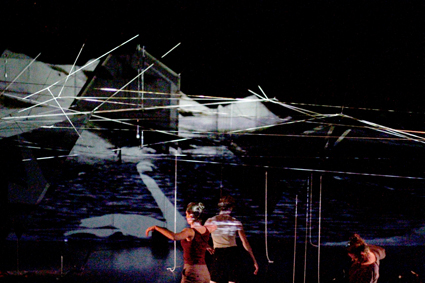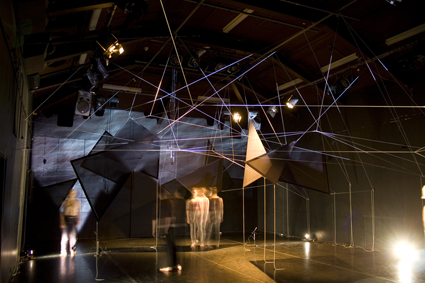asleep but awake and dancing
zsuzsanna sobolsay: ql2 dance theatre, noplace

Holly Diggle, Janine Proost, Alison Plevey, noplace, ql2
photo Christiane Nowak
Holly Diggle, Janine Proost, Alison Plevey, noplace, ql2
THERE ARE MANY IRONIES THAT PLAY OUT IN QL2 DANCE THEATRE’S NOPLACE. THE FIRST IS THAT HYPNAGOGIA—A STATE BETWEEN SLEEP AND WAKEFULNESS—CAN INVOLVE A KIND OF PARALYSIS, WHERE THE SLEEP-WAKER’S BODY IS UNABLE TO MOVE. HENCE, A DANCE PIECE ABOUT HYPNAGOGIA IS PERHAPS FROM THE OUTSET OPERATING WITHIN A PROBLEMATIC PARADIGM. HYPNAGOGIA IS ALSO, REPORTEDLY, A PLACE OF GREAT DISTRESS FOR THOSE SUFFERING THE CONDITION AS A NEUROLOGICAL DISORDER.
I am not convinced the creative team explored this distress so much as the idea of moving from conscious through to unconscious states—a ‘space in-between’; nonetheless the ironies of moving bodies representing such a ‘no place’ is sufficient meat for a performance investigation.
The co-creators asked their audience to enter and walk over the stage area, beneath a suspended set like a cat’s cradle or incomplete geodesic canopy strung above our heads. We were then asked to sit in conservative figuration on raked seats. It was disappointing to remain neither re-configured, nor left to trust that conventional audience-performer relations might be overcome by means other than surround-sound or surround-design. But this could have been due to the short rehearsal time.

Alison Plevey, Amelia McQueen, Holly Diggle, noplace, ql2
photo Sarah Kaur
Alison Plevey, Amelia McQueen, Holly Diggle, noplace, ql2
The performance itself is an exploration of movement, spoken text, projected images and scratchings/slidings of sound in a dim-lit space. Sarah Kaur, in her JUMP mentorship with Samuel James, had explored re-framing images of an Icelandic landscape by disappearing its horizons and flattening the visual plane, creating places not quite here, not quite there. Sometimes, unexplained memory-images appear, such as a flock of swans. At times, projections played over dancers’ bodies, rendering them liminal, as if submerged in a dream.
Christiane Nowak’s design remains, for me, the most resolved aspect of the presentation—consistent to itself but also with a strong hold on what the piece is moving toward. Overall, however, I miss a sense of internal consistency between the sound, movement and visual elements explored.
The fragmentary structure suits an investigation into the subconscious, but in general dancers’ movements, and their vocal delivery, suffer from too much coherence and flow. It takes a while for discombobulation to infect or inflect their offers. Memorably, Amelia McQueen’s performance is both muscular (coherent) and fragmented (brittle). Her miked vocal work, however, reveals beautiful but too-coherent texts and highlights the frequent inaudibility of other dancers’ words. Shoeb Ahmad’s soundscape, partly created in real time, is appropriately fractured but homogenous in volume and tone.

noplace, ql2
photo Christiane Nowak
noplace, ql2
Over the past decade, Canberrans have seen a run of interesting pieces around sleep, dreams and hypnogogic states. Blaide Lallemand and Hilary Cuerden-Clifford’s video bank of sleeping figures was installed in CMAG’s glass walled, street-side gallery in 2009. Preceding and surpassing this, however, was Wendy Morrow’s sequence of investigations into sleep/dream states involving dance, projection and sound: Sleep, Blue, and Sleep II. Morrow’s work, created 2002-04, remains a touchstone for examining semi-conscious states, half-recognised forebodings and muted ferocities that flare but cannot be fully realised.
At this stage of development, noplace sets up an intriguing quandary: how to heighten the discombobulations of the hypnogogic state into a more consistent whole. There is evidence that with more creative development time these skilled artists will find what they are moving towards.
QL2 Dance Theatre, noplace, choreographer Adelina Larsson, performers Amelia McQueen, Holly Diggle, Alison Plevey, Janine Proost, designer Christiane Nowak, video artist Sarah Tamara Kaur, sound artist Shoeb Ahmad, JUMP mentor Samuel James, dramaturgical consultancy Paschal Berry, Gorman House, Canberra, June 9, 10
RealTime issue #110 Aug-Sept 2012 pg. web






